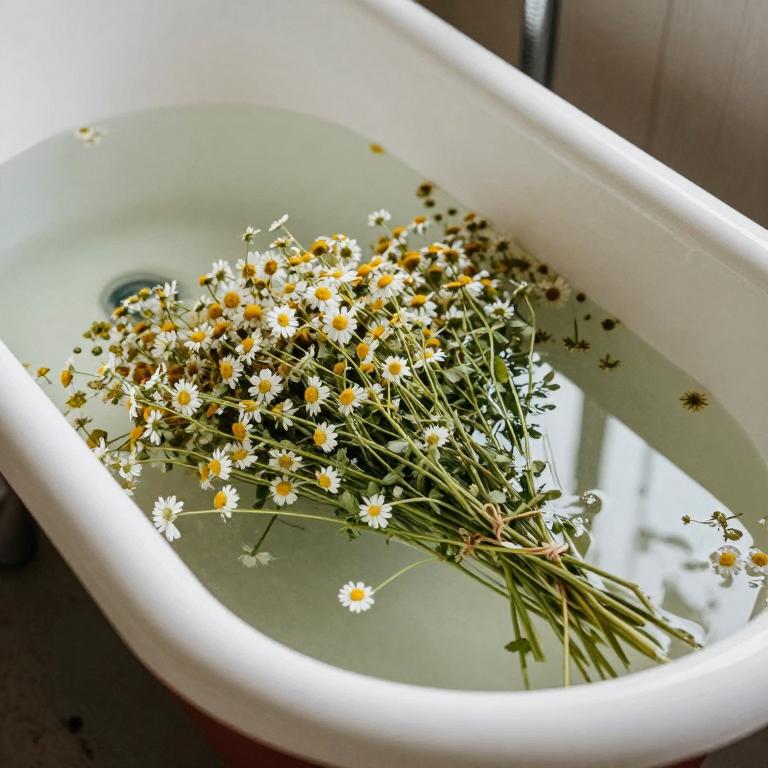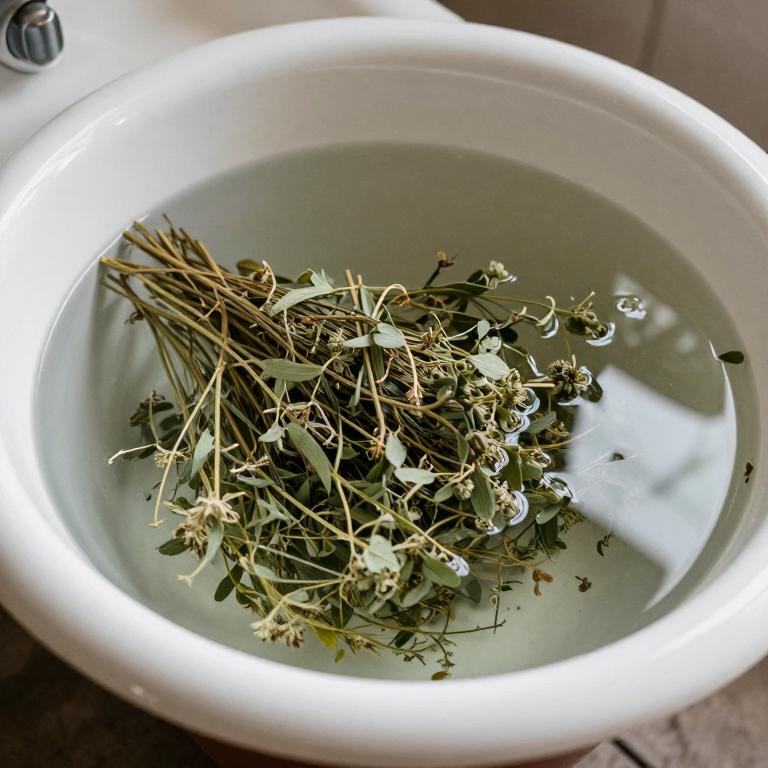10 Best Herbal Baths For Premenstrual Syndrome

Herbal baths have gained popularity as a natural remedy for alleviating symptoms of premenstrual syndrome (PMS).
Certain herbs, such as chamomile, lavender, and ginger, are known for their calming and anti-inflammatory properties, which can help reduce bloating, mood swings, and tension. Soaking in a warm bath infused with these herbs can promote relaxation and ease the physical and emotional discomfort associated with PMS. Many women find that the soothing effects of herbal baths provide a gentle and holistic approach to managing their symptoms without the use of pharmaceuticals.
However, it is important to consult with a healthcare provider before using herbal baths, especially for those with allergies or specific medical conditions.
Table of Contents
- 1. Valerian (Valeriana officinalis)
- 2. Rosemary (Rosmarinus officinalis)
- 3. English lavender (Lavandula angustifolia)
- 4. Salvia (Salvia officinalis)
- 5. Chamomile (Matricaria chamomilla)
- 6. Ginger (Zingiber officinale)
- 7. Lemon balm (Melissa officinalis)
- 8. Yarrow (Achillea millefolium)
- 9. Stinging nettle (Urtica dioica)
- 10. Field horsetail (Equisetum arvense)
1. Valerian (Valeriana officinalis)

Valeriana officinalis, commonly known as valerian, is a herbal remedy that has been traditionally used to alleviate symptoms of premenstrual syndrome (PMS).
When incorporated into herbal baths, valerian can help soothe the nervous system and reduce anxiety and irritability, which are common PMS symptoms. The calming properties of valerian are believed to stem from its ability to increase the levels of certain neurotransmitters in the brain, such as GABA. To prepare a valerian bath, a few tablespoons of dried valerian root can be steeped in hot water and then added to a tub of warm water.
Regular use of valerian herbal baths may offer a natural and relaxing way to manage PMS-related discomfort.
2. Rosemary (Rosmarinus officinalis)

Rosmarinus officinalis, commonly known as rosemary, has been traditionally used in herbal baths to alleviate symptoms of premenstrual syndrome (PMS).
The essential oils derived from rosemary leaves contain compounds like cineole and camphor, which have calming and anti-inflammatory properties. When used in a warm bath, these oils can help reduce stress, ease muscle tension, and promote relaxation, all of which are common PMS symptoms. Incorporating rosemary into a bath routine can also improve circulation and support overall emotional well-being during the premenstrual phase.
However, it is advisable to consult a healthcare professional before using essential oils, especially for those with sensitive skin or specific medical conditions.
3. English lavender (Lavandula angustifolia)

Lavandula angustifolia, commonly known as English lavender, has been widely used in herbal baths to alleviate symptoms of premenstrual syndrome (PMS).
The soothing properties of lavender essential oil, when infused into bathwater, can help reduce stress, anxiety, and mood swings associated with PMS. The calming aroma of lavender promotes relaxation and improves sleep quality, which are often disrupted during the premenstrual phase. Studies suggest that regular use of lavender-infused baths may help ease physical discomfort such as bloating and cramps.
Incorporating lavender into a warm bath can be a simple, natural, and effective way to support emotional and physical well-being during the menstrual cycle.
4. Salvia (Salvia officinalis)

Salvia officinalis, commonly known as sage, has been traditionally used in herbal baths to alleviate symptoms of premenstrual syndrome (PMS).
The aromatic properties of sage leaves, when infused into bath water, are believed to promote relaxation and ease tension, common PMS-related discomforts. Sage contains compounds like thujone and rosmarinic acid, which may have anti-inflammatory and calming effects on the body. Taking a sage-infused bath can help reduce bloating, mood swings, and irritability associated with PMS by improving circulation and inducing a sense of well-being.
While more research is needed, many women find comfort in using sage baths as a natural, soothing remedy during their menstrual cycle.
5. Chamomile (Matricaria chamomilla)

Matricaria chamomilla, commonly known as chamomile, has been traditionally used in herbal baths to alleviate symptoms of premenstrual syndrome (PMS).
The calming properties of chamomile are believed to help reduce anxiety, irritability, and mood swings associated with PMS. When added to warm water, chamomile essential oil or dried flowers can create a soothing bath that promotes relaxation and ease muscle tension. Studies suggest that the anti-inflammatory and antispasmodic effects of chamomile may help ease physical discomfort during the premenstrual phase.
As a natural remedy, chamomile baths offer a gentle and accessible option for women seeking relief from PMS symptoms without pharmaceutical interventions.
6. Ginger (Zingiber officinale)

Zingiber officinale, commonly known as ginger, has been traditionally used in herbal baths to alleviate symptoms of premenstrual syndrome (PMS).
The warming properties of ginger help to relax muscles and improve circulation, which can reduce cramping and bloating associated with PMS. When incorporated into a bath, ginger's active compounds, such as gingerol and shogaol, may help to ease inflammation and promote a sense of well-being. These baths are often recommended as a natural, aromatherapy-enhanced alternative to pharmaceutical treatments.
Regular use of ginger-infused baths can provide a soothing and holistic approach to managing PMS symptoms.
7. Lemon balm (Melissa officinalis)

Melissa officinalis, commonly known as lemon balm, has been traditionally used in herbal baths to alleviate symptoms of premenstrual syndrome (PMS).
When infused into bath water, the calming properties of lemon balm can help reduce anxiety, irritability, and tension often associated with PMS. The aromatic compounds in lemon balm are believed to promote relaxation and improve mood through their soothing effects on the nervous system. Herbal baths with Melissa officinalis may also aid in reducing bloating and promoting overall emotional well-being during the premenstrual phase.
While more research is needed, many women find these natural remedies to be a gentle and effective complement to conventional PMS management strategies.
8. Yarrow (Achillea millefolium)

Achillea millefolium, commonly known as yarrow, has been traditionally used in herbal baths to alleviate symptoms of premenstrual syndrome (PMS).
The plant contains compounds such as flavonoids and essential oils that may help reduce inflammation and promote relaxation, which can ease common PMS symptoms like bloating, irritability, and cramps. When infused into a bath, yarrow can have a calming effect on the body, potentially improving mood and reducing stress associated with the menstrual cycle. Its astringent properties may also help in reducing fluid retention, a common issue during the premenstrual phase.
While more research is needed, many individuals find relief from PMS symptoms through regular use of yarrow herbal baths as a natural and soothing remedy.
9. Stinging nettle (Urtica dioica)

Urtica dioica, commonly known as stinging nettle, has been traditionally used in herbal baths to alleviate symptoms of premenstrual syndrome (PMS).
The leaves of this plant contain compounds such as silica, potassium, and magnesium, which may help reduce bloating, muscle tension, and mood swings associated with PMS. When used in a warm bath, the soothing properties of stinging nettle can promote relaxation and ease discomfort. Some studies suggest that the anti-inflammatory and diuretic effects of nettle may support hormonal balance and reduce water retention.
However, it is important to consult with a healthcare provider before using stinging nettle baths, especially for those with allergies or existing health conditions.
10. Field horsetail (Equisetum arvense)

Equisetum arvense, commonly known as horse tail, has been traditionally used in herbal baths to alleviate symptoms of premenstrual syndrome (PMS).
The plant contains silica and various bioactive compounds that may help reduce inflammation and soothe muscle tension, common complaints during PMS. When used in warm baths, Equisetum arvense can promote relaxation and improve circulation, potentially easing cramps and mood swings associated with the menstrual cycle. Some studies suggest that its anti-inflammatory properties may support hormonal balance and reduce bloating.
However, it is important to consult a healthcare provider before using Equisetum arvense, as it may interact with certain medications or have contraindications for specific health conditions.